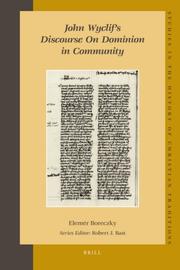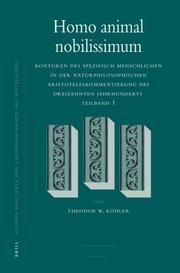| Listing 1 - 4 of 4 |
Sort by
|

ISBN: 9789004163492 Year: 2008 Volume: 139 Publisher: Leiden Boston Brill
Abstract | Keywords | Export | Availability | Bookmark
 Loading...
Loading...Choose an application
- Reference Manager
- EndNote
- RefWorks (Direct export to RefWorks)
Church and state --- Church property --- 233 --- Property, Church --- Church polity --- Property --- De mens. Theologische antropologie --- Wycliffe, John,
Book
ISBN: 9783451299445 Year: 2008 Publisher: Freiburg Herder
Abstract | Keywords | Export | Availability | Bookmark
 Loading...
Loading...Choose an application
- Reference Manager
- EndNote
- RefWorks (Direct export to RefWorks)
Theological anthropology --- 233 --- Anthropology, Doctrinal --- Anthropology, Theological --- Body and soul (Theology) --- Doctrinal anthropology --- Humanity, Doctrine of --- Man, Doctrine of --- Man (Theology) --- Mankind, Doctrine of --- Religion --- De mens. Theologische antropologie --- Christian dogmatics

ISBN: 1281939943 9786611939946 9047431693 9789047431695 9004162895 9789004162891 9789004278301 9789004278530 9789004278547 9789004278554 Year: 2008 Volume: 94, 114 Publisher: Leiden Boston Brill
Abstract | Keywords | Export | Availability | Bookmark
 Loading...
Loading...Choose an application
- Reference Manager
- EndNote
- RefWorks (Direct export to RefWorks)
This monograph deals with the philosophical approach of thirteenth-century masters to concrete, practical manifestations of 'quantum ad naturalia' in human lives in their commentaries on Aristotle’s works on natural philosophy, both his genuine works and those then considered genuine. It inquires into what they deemed worthy of philosophical debate regarding this topic and how they tackled it. The first of the two volumes describes the cultural surroundings, the scholars’ way of approaching the topic, and their discourses on the peculiarity (singularity, unity, consistency) of humankind and on its internal differentiation according to gender, stage of life, social stratification, and differences due to ethnic status or geographic (climatic) diversity. This is the first comprehensive source-based study of the subject; it draws heavily on unedited texts.
Philosophical anthropology --- Philosophy, Medieval. --- Medieval philosophy --- Scholasticism --- History. --- Aristotle. --- Aristoteles --- Aristote --- Aristotle --- Arisṭāṭṭil --- Aristo, --- Aristotel --- Aristotele --- Aristóteles, --- Aristòtil --- Aristotile --- Arisṭū --- Arisṭūṭālīs --- Arisutoteresu --- Arystoteles --- Ya-li-shih-to-te --- Ya-li-ssu-to-te --- Yalishiduode --- Yalisiduode --- Ἀριστοτέλης --- Αριστοτέλης --- Аристотел --- ארסטו --- אריםטו --- אריסטו --- אריסטוטלס --- אריסטוטלוס --- אריסטוטליס --- أرسطاطاليس --- أرسططاليس --- أرسطو --- أرسطوطالس --- أرسطوطاليس --- ابن رشد --- اريسطو --- Pseudo Aristotele --- Pseudo-Aristotle --- アリストテレス --- Philosophy, Medieval --- 1 <38> ARISTOTELES --- 13 --- 233 --- 1 <38> ARISTOTELES Griekse filosofie--ARISTOTELES --- Griekse filosofie--ARISTOTELES --- History --- Wijsgerige antropologie. Mens. Menselijke natuur --- De mens. Theologische antropologie --- Aristoteles. --- Animals (Philosophy) --- Human-animal relationships --- Philosophie médiévale --- Anthropologie philosophique --- Animaux (Philosophie) --- Relations homme-animal --- Histoire --- Thirteenth century.
Book
ISBN: 1282069683 9786612069680 0226093174 9780226093178 9780226093154 0226093158 Year: 2008 Publisher: Chicago, Ill. University of Chicago Press
Abstract | Keywords | Export | Availability | Bookmark
 Loading...
Loading...Choose an application
- Reference Manager
- EndNote
- RefWorks (Direct export to RefWorks)
Humanity's creative capacity has never been more unsettling than it is at our current moment, when it has ushered us into new technological worlds that challenge the very definition of "the human." Those anxious to safeguard the human against techno-scientific threats often appeal to religious traditions to protect the place and dignity of the human. But how well do we understand both theological tradition and today's technological culture? In The Indiscrete Image, Thomas A. Carlson challenges our common ideas about both, arguing instead that it may be humanity's final lack of definition that first enables, and calls for, human creativity and its correlates-including technology, tradition, and their inextricable interplay within religious existence. Framed in response to Martin Heidegger's influential account of the relation between technological modernity and theological tradition, The Indiscrete Image builds an understanding of creativity as conditioned by insurmountable unknowing and incalculable possibility through alternative readings of Christian theological tradition and technological culture-and the surprising resonance between these two. Carlson concludes that the always ongoing work of world creation, tied essentially to human self-creation, implies neither an idol's closure nor an icon's transcendence, but the "indiscrete image" whose love makes possible-by keeping open-both the human and its world.
Theological anthropology --- Philosophical anthropology. --- Negative theology. --- Postmodernism --- Technology --- Man (Christian theology) --- Anthropology, Philosophical --- Man (Philosophy) --- Civilization --- Life --- Ontology --- Humanism --- Persons --- Philosophy of mind --- Christianity. --- Religious aspects --- Philosophy --- Heidegger, Martin, --- Khaĭdegger, Martin, --- Haĭdegger, Martin, --- Hīdajar, Mārtin, --- Hai-te-ko, --- Haidegŏ, --- Chaitenger, Martinos, --- Chaitenker, Martinos, --- Chaintenger, Martin, --- Khaĭdeger, Martin, --- Hai-te-ko-erh, --- Haideger, Marṭinn, --- Heidegger, M. --- Haideger, Martin, --- Hajdeger, Martin, --- הייגדר, מרתין --- היידגר, מרטין --- היידגר, מרטין, --- 海德格尔, --- Chaintenker, Martin, --- Hāydigir, Mārtīn, --- Hīdigir, Mārtīn, --- هاىدگر, مارتين, --- هىدگر, مارتين, --- Negative theology --- Philosophical anthropology --- 230*705 --- 233 --- 230*705 Post-moderne theologie. Postmoderne theologie --- Post-moderne theologie. Postmoderne theologie --- Applied science --- Arts, Useful --- Science, Applied --- Useful arts --- Science --- Industrial arts --- Material culture --- Post-modernism --- Postmodernism (Philosophy) --- Arts, Modern --- Avant-garde (Aesthetics) --- Modernism (Art) --- Philosophy, Modern --- Post-postmodernism --- Religious aspects&delete& --- Christianity --- De mens. Theologische antropologie --- Heidegger, Martin --- creativity, humanity, technology, religion, tradition, heidegger, modernity, theology, creation, transcendance, love, theological anthropology, postmodernism, christianity, technopoetics, mysticism, spirituality, faith, belief, inspiration, hope, futures, possible worlds, nonfiction, history, infinite, human spirit, possibility, potential.
| Listing 1 - 4 of 4 |
Sort by
|

 Search
Search Feedback
Feedback About UniCat
About UniCat  Help
Help News
News